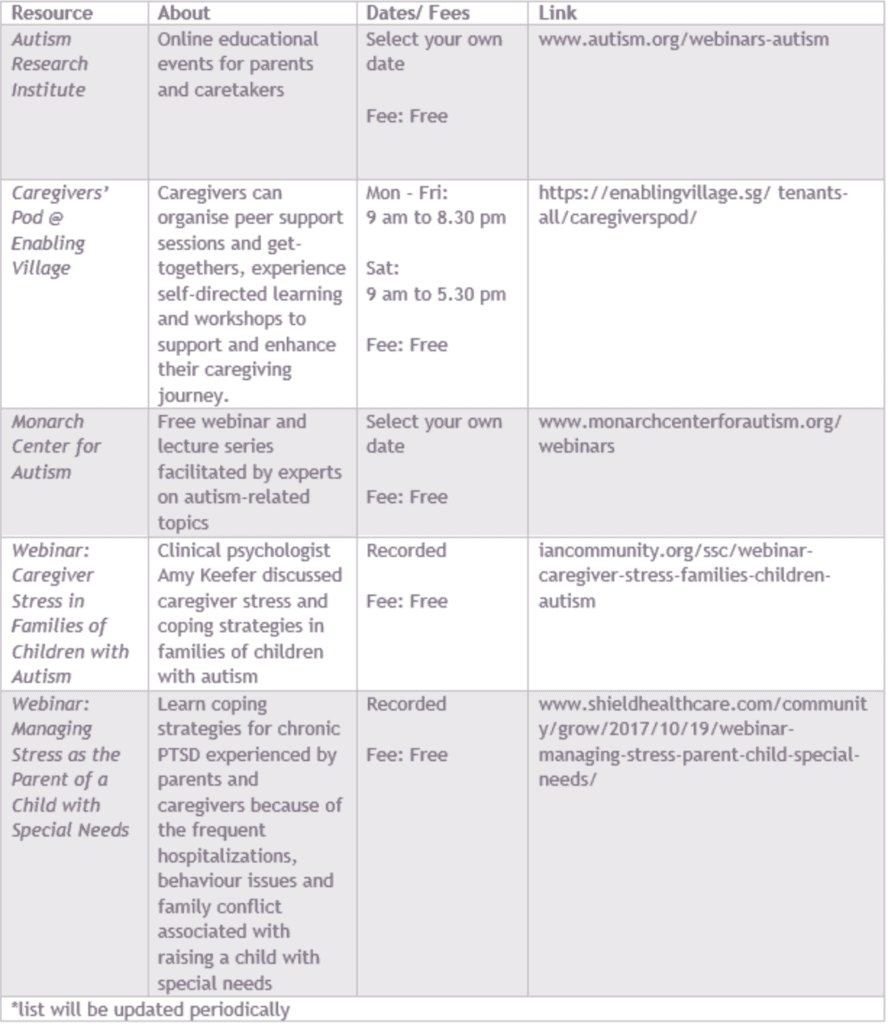The Reality of Caregiver Burnout
Caring for your child can be emotionally draining, time-consuming, stressful and can create a sense of imbalance in the family system.
It is easy to neglect your own well-being in this challenging process. However, it is also important to take care of your own emotional and physical health.
Why? Doing so will not only improve your well-being, but also puts you in a better position to care for your child. When you take care of yourself and get sufficient downtime, your energy level, motivational level, and even your capacity to think improves. If you’re in a better condition, you will be able to provide better care for your child.
Symptoms of Caregiver Burnout
You are not alone on this journey!
In 2014, a survey conducted by the National Council of Social Services found that nearly half of the caregivers surveyed experienced caregiver strain, with 4 in 10 being psychologically distressed, and more than 6 in 10 felt burdened by the weight of their caregiving duties.
Caregivers may experience physical effects such as fatigue and body aches as well as psychological effects such as stress, emotional tiredness, depression, and anxiety.
Techniques for Self-Care
Below are some practices to follow in your daily lifestyles to improve your mental & physical health:
- 3-steps mindfulness exercise
- Get regular sleep and exercise
- Accept that there is a limit to what you can do
- Allow some time off to pursue your own interests
- Take regular breaks
- Seek help and support from your loved ones
- Seek professional support from a counsellor or psychologist
- Join a community support system for parents (or any relevant support group)
3-steps Mindfulness Exercise
A Simple 5 Minute Exercise

1. Bring awareness to what you are doing, thinking, and sensing at this moment. Notice the thoughts that come up and acknowledge your feelings, but let them pass. 2. Bring awareness to your breathing for six breaths or a minute. Be aware of the movement of your body with each breath, of how your chest rises and falls, how your belly pushes in and out, and how your lungs expand and contract. 3. Expand awareness outwards, first to your body then to the environment. Notice the sensations you are experiencing, like tightness, or perhaps a lightness in your face or shoulders. Keep in mind your body as a whole; If you wish, you can then expand your awareness even further to the environment around you. Bring your attention to what is in front of you. Notice the colours, shapes, patterns, and textures of the objects you can see. Be present at this moment, in your awareness of your surroundings.
Techniques for Self-Care
Caregivers can attend courses to better understand their child’s condition and to learn behavioural and cognitive strategies to cope with stress and develop confidence in their abilities to overcome difficulties. Here is just a list for parents with children suffering from autism, who require support:

If you feel like you need professional help, do reach out or book an appointment with Annabelle Psychology.
Article provided by Annabelle Psychology (Source)




